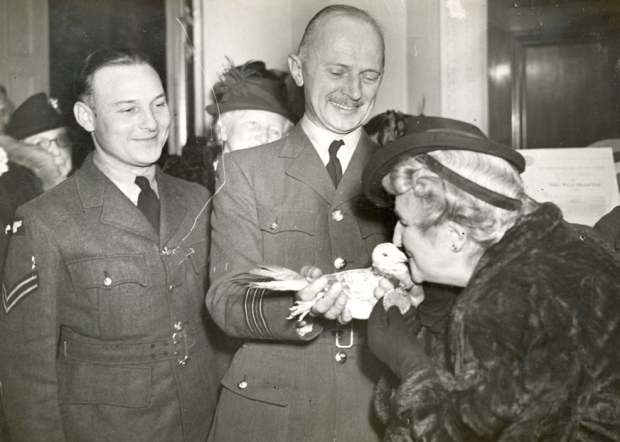
We can all likely recall the beloved cartoon carrier pigeons with their leather aviator caps and goggles, hauling mailbags through the skies. While it was certainly funny, carrier pigeons were in fact very important. Before modern communication technologies, the armed forces were often reliant on pigeons to deliver important messages. Carrier pigeons performed a crucial role in wartime. They even received the highest honors for their service in WWII.
Pigeons like GI Joe, who saved British forces from US Air Force bombs after they lost radio contact, or White Vision who flew over the sea in dense fog to report the position of a lost aircraft in the Hebrides, or Gustav who delivered the first messages from the beaches at Normandy.
Thousands of pigeons were drafted for Allied service during WWII. Special orders to the military protected the birds from harm, and in Britain, birds of prey were culled so that the pigeons would have no opposition in reaching their intended destinations. If a soldier hurt or killed a pigeon, they faced six months in prison. Protection even went as far as the rationing of pigeon corn.
The pigeons transportation to the field of battle is more amusing than even the funniest of the animated pigeons we remember. The service pigeons of WWII arrived in wicker baskets on the backs of soldiers or were parachuted in.
Our hero, Gustav (bird NPS.42.31066), was one of those that descended from the sky as an avian paratrooper. This was not the first air rodeo for the grizzle colored pigeon soldier – he had served before in the Belgian resistance. Trained by Frederick Jackson of Cosham, Hampshire, he had entered RAF service when he, along with six other pigeons, had been given to Reuters news correspondent Montague Taylor by his handler, Sergeant Harry Halsey.
On D-Day, June 6, 1944, Gustav and Taylor were aboard an Allied ship off the coast of Normandy. The fleet was under radio silence. Taylor released Gustav, who in just five hours and sixteen minutes reached RAF Thorney Island 150 miles away to relay the message that the Allies had landed.
The brave pigeon made that distance in such a short time despite headwinds of 30 mph. The message read: “We are just 20 miles or so off the beaches. First assault troops landed 0750. Signal says no interference from enemy gunfire on beach . . . Steaming steadily in formation. Lightnings. Typhoons. Fortresses crossing since 0545. No enemy aircraft seen.” It was the first word of the invasion that the UK heard. Later that day, his friend Paddy the pigeon, made the trip back to the mainland to tell of the invasion’s success.
Both birds were awarded the Dickin Medal for bravery, an award reserved for “any animal displaying conspicuous gallantry and devotion to duty.” This highest of honors for animals serving in the British Armed Forces was awarded to Gustav for “delivering the first message from the Normandy beaches from a ship off the beachhead, while serving with the RAF on June 6 1944” and to Paddy “for the best recorded time with a message from the Normandy Operations, while serving with the RAF in June 1944.”
The awards were presented by the wife of the First Lord of the Admiralty on November 27, 1944. For service in WWII, a total of 53 animals were given the Dickin award, 32 of which were pigeons.
Gustav and his friends were remembered in 2005 by both an animated movie, Valiant, and with a memorial at the D-day Museum in Portsmouth, Hampshire in the UK.
Gustav’s medal was proudly displayed at the museum. Of him, the head of the museum, Paul Raymond said, “With the 61st anniversary of D-Day on 6 June this is the first time the medal has been displayed in Portsmouth. Gustav was a real local hero, putting his life on the line to bring back vital information on the success of D-Day.”
This pigeon played his part in the defeat of the Nazis and Gustav is surely worthy of being commemorated.
Sources: